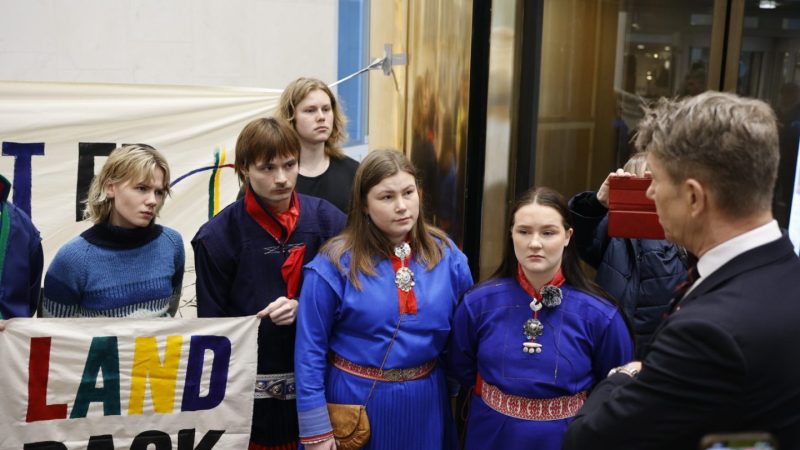UPDATED: Activists promoting both Sami and environmental interests occupied Norway’s Oil & Energy Ministry through the weekend, and then blocked all its entrances on Monday. It was their latest effort to get the government to finally respect a Supreme Court decision from 2021, which ruled that large wind turbines built on Sami grazing land at Fosen in Trøndelag violate their human rights.

The Sami and many others who opposed the controversial construction of the turbines on the scenic Fosen mountain plateau first entered the ministry’s lobby in downtown Oslo on Thursday and later refused to leave. “We’ll sit here as long as we have to,” said Eller Nystad, leader of the youth chapter of Norske Samers Riksforbund, a national Sami federation. “We won’t leave until the government listens to our demands.”
Police were, however, called in late Sunday night, with state broadcaster NRK reporting that the demonstrators were given 15 minutes to leave the building. When they refused, they were carried out, one by one, given citatations but then released. Most then headed straight back to the ministry for ongoing protests outdoors.
By mid-afternoon on Monday the protests were turning dramatic again, with police returning to remove demonstrators now blocking the entrances to the ministry. Among them was Swedish activist Greta Thunberg, who harshly criticizes the authorities’ handling of the Fosen case. She and other activists ended up chaining themselves to a side-entrance as scores of police cars arrived to break up the demonstration.
The Sami fought long and hard against construction of the wind turbines that disturb their reindeer herds. They ultimately sued the companies involved and state authorities who allowed them to be built. Their suit went all the way to the Supreme Court and they won in 2021, only to be met with more objections by the state and what the protesters consider delaying tactics.

Thursday marked 500 days since Norway’s highest court ruled that the wind power turbines were built in violation of reindeer herders’ cultural heritage and thus a violation of of their human rights. The court stopped short of ordering compensation for what the Sami considered virtual expropriation of their grazing land, but declared that the state’s permission to build the turbines was invalid. The Sami and environmentalists want the turbines to be torn down and the grazing land restored but 16 months later, all 151 turbines remain in operation. The government insists new studies are now needed to come up with “new measures” that presumably would allow the turbines and reindeer to co-exist.
Sami leaders and several other top politicians in Norway have been protesting ever since, and calling the turbines yet another injustice against the country’s indigenous people. Norway usually defends minorities in other countries, but commentator Harald Stanghelle wrote in newspaper Aftenposten recently that when Sami interests collide with the state’s interests, the state does not take the Sami minorities’ side.
It’s the latest of several conflicts between the state and the Sami, and many are comparing it to the Samis’ battle to preserve the Alta River years ago. Several legal experts including the Norwegian Bar Association’s human rights commission warn that the Norwegian government is violating important principles with their interpretation of the Supreme Court’s ruling in the Fosen case. The state disagrees, claiming the high court’s ruling doesn’t order them to dismantle the turbines and only states that the turbines can limit the Sami’s traditional grazing but haven’t yet, making it a potential but not an actual violation of their rights. The bar association calls that an “absurd” approach.
“It can appear that the state in practice finds it difficult to accept defeat,” wrote Stanghelle in Aftenposten. “Perhaps the government is speculating that the Sami will give up and accept some sort of compromise? Or that the economic interests at stake are too strong?”

While powerful financial interests are behind the huge windmill project at Fosen, neither the Sami nor environmental activists from organizations including Natur og Ungdom (Nature and Youth) show any signs of giving up. On Sunday they were joined by the president of the Sami Parliament and on Monday by the internationally prominent Swedish activist Thunberg. She showed up in the middle of the night and wasn’t allowed inside the occupied ministry, but later joined the protests outdoors.

The president of the Sami Parliament in Norway, Silje Karine Muotka, had also appealed to the state in her New Year’s Eve address. She’ll be meeting with Oil & Energy Minister Terje Aasland on Thursday and said on Sunday that she also expects to discuss the issue with Prime Minister Jonas Gahr Støre. She points to how the Supreme Court rendered the state’s license for the turbines invalid and is disappointed the state “hasn’t respected” the Supreme Court decision or obeyed it.
“That’s serious for those directly affected but also for the rest of us,” Muotka wrote in newspaper Dagsavisen in January. “Norway is a state governed by law, and when even a Supreme Court decision doesn’t mean anything, what does that say about our country?” Anna Blix, a biologist and adviser to the Reds Party, wrote in newspaper Klassekampen earlier this month that the government was putting itself above the law by not acting in accordance with the court decision.

The Reds, the Socialist Left and the Greens parties all think the state should apologize to the Sami, respect the Supreme Court decision and dismantle the turbines. The state, through power agency Statkraft, owns 52.1 percent of the turbines’ operating company Fosen Vind. Trønderenergi owns 7.9 percent, so has power to act but large investments and lots of money are also at stake.
Oil & Energy Minister Aasland met with the demonstrators late last week and allowed them to stay in the ministry’s lobby through the weekend, telling state broadcaster NRK on Sunday night that he thought it was good “that young people demonstrate.” On Monday morning he was claiming that he did not order the police to evict them late Sunday night, blaming state security officials for that decision. He’s showing no signs, however, of acting on the demonstrators’ demands, claiming once again that a new study of the issue is needed and likely to take up to another year to complete.

“We need to do things correctly and can’t rush this,” he said, repeating statements made last year as well. “We shall have a legal basis for the process we have chosen.” He has denied the ministry is putting itself above the law.
“Even though the Supreme Court has evaluated that the permission (for the turbines) that was given is invalid, they didn’t take a position on what should happen with them,” Aasland told Klassekampen last spring. “And that’s what we must evaluate in the process ahead.”
NewsinEnglish.no/Nina Berglund

